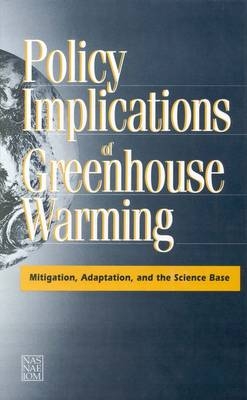
Policy Implications of Greenhouse Warming
National Academies Press (Verlag)
978-0-309-04386-1 (ISBN)
Global warming continues to gain importance on the international agenda and calls for action are heightening. Yet, there is still controversy over what must be done and what is needed to proceed.
Policy Implications of Greenhouse Warming describes the information necessary to make decisions about global warming resulting from atmospheric releases of radiatively active trace gases. The conclusions and recommendations include some unexpected results. The distinguished authoring committee provides specific advice for U.S. policy and addresses the need for an international response to potential greenhouse warming.
It offers a realistic view of gaps in the scientific understanding of greenhouse warming and how much effort and expense might be required to produce definitive answers.
The book presents methods for assessing options to reduce emissions of greenhouse gases into the atmosphere, offset emissions, and assist humans and unmanaged systems of plants and animals to adjust to the consequences of global warming.
Table of Contents
Front Matter
Part One: Synthesis
1 Introduction
2 Background
3 The Greenhouse Gases and Their Effects
4 Policy Framework
5 Adaptation
6 Mitigation
7 International Considerations
8 Findings and Conclusions
9 Recommendations
Individual Statement by a Member Of The Synthesis Panel
Part Two: The Science Base
10 Introduction
11 Emission Rates and Concentrations Of Greenhouse Gases
12 Radiative Forcing and Feedback
13 Model Performance
14 The Climate Record
15 Hydrology
16 Sea Level
17 A Greenhouse Forcing and Temperature Rise Estimation Procedure
18 Conclusions
Part Three: Mitigation
19 Introduction
20 Framework for Evaluating Mitigation Options
21 Residential and Commercial Energy Management
22 Industrial Energy Management
23 Transportation Energy Management
24 Energy Supply Systems
25 Nonenergy Emission Reduction
26 Population
27 Deforestation
28 Geoengineering
29 Findings and Recommendations
Part Four: Adaptation
30 Findings
31 Recommendations
32 Issues, Assumptions, and Values
33 Methods and Tools
34 Sesitivities, Impacts, and Adaptations
35 Indices
36 Final Words
Individual Statement by a Member of the Adaptation Panel
Appendixes
A Questions and Answers About Greenhouse Warming
B Thinking About Time in the Context of Global Climate Change
C Conservation Supply Curves for Buildings
D Conservation Supply Curves for Industrial Energy Use
E Conservation Supply Data for Three Transportation Sectors
F Transportation System Management
G Nuclear Energy
H A Solar Hydrogen System
I Biomass
J Cost-Effectiveness of Electrical Generation Technologies
K Cost-Effectiveness of Chlorofluorocarbon PhaseoutUnited States and Worldwide
L Agriculture
M Landfill Methane Reduction
N Population Growth and Greenhouse Gas Emissions
O Deforestation Prevention
P Reforestation
Q Geoengineering Options
R Description of Economic Estimates of the Cost of Reducing Greenhouse Emissions
S Glossary
T Conversion Tables
U Prefaces from the Individual Panel Reports
V Acknowledgments from the Individual Panel Reports
W Background Information on Panel Members and Professional Staff
Index
Panel on Policy Implications of Greenhouse Warming, National Academy of Sciences, National Academy of Engineering, Institute of Medicine
1 Front Matter; 2 Part One: Synthesis; 3 1 Introduction; 4 2 Background; 5 3 The Greenhouse Gases and Their Effects; 6 4 Policy Framework; 7 5 Adaptation; 8 6 Mitigation; 9 7 International Considerations; 10 8 Findings and Conclusions; 11 9 Recommendations; 12 Individual Statement by a Member Of The Synthesis Panel; 13 Part Two: The Science Base; 14 10 Introduction; 15 11 Emission Rates and Concentrations Of Greenhouse Gases; 16 12 Radiative Forcing and Feedback; 17 13 Model Performance; 18 14 The Climate Record; 19 15 Hydrology; 20 16 Sea Level; 21 17 A Greenhouse Forcing and Temperature Rise Estimation Procedure; 22 18 Conclusions; 23 Part Three: Mitigation; 24 19 Introduction; 25 20 Framework for Evaluating Mitigation Options; 26 21 Residential and Commercial Energy Management; 27 22 Industrial Energy Management; 28 23 Transportation Energy Management; 29 24 Energy Supply Systems; 30 25 Nonenergy Emission Reduction; 31 26 Population; 32 27 Deforestation; 33 28 Geoengineering; 34 29 Findings and Recommendations; 35 Part Four: Adaptation; 36 30 Findings; 37 31 Recommendations; 38 32 Issues, Assumptions, and Values; 39 33 Methods and Tools; 40 34 Sesitivities, Impacts, and Adaptations; 41 35 Indices; 42 36 Final Words; 43 Individual Statement by a Member of the Adaptation Panel; 44 Appendixes; 45 A Questions and Answers About Greenhouse Warming; 46 B Thinking About Time in the Context of Global Climate Change; 47 C Conservation Supply Curves for Buildings; 48 D Conservation Supply Curves for Industrial Energy Use; 49 E Conservation Supply Data for Three Transportation Sectors; 50 F Transportation System Management; 51 G Nuclear Energy; 52 H A Solar Hydrogen System; 53 I Biomass; 54 J Cost-Effectiveness of Electrical Generation Technologies; 55 K Cost-Effectiveness of Chlorofluorocarbon Phaseout-United States and Worldwide; 56 L Agriculture; 57 M Landfill Methane Reduction; 58 N Population Growth and Greenhouse Gas Emissions; 59 O Deforestation Prevention; 60 P Reforestation; 61 Q Geoengineering Options; 62 R Description of Economic Estimates of the Cost of Reducing Greenhouse Emissions; 63 S Glossary; 64 T Conversion Tables; 65 U Prefaces from the Individual Panel Reports; 66 V Acknowledgments from the Individual Panel Reports; 67 W Background Information on Panel Members and Professional Staff; 68 Index
| Erscheint lt. Verlag | 1.2.1992 |
|---|---|
| Verlagsort | Washington |
| Sprache | englisch |
| Maße | 216 x 279 mm |
| Themenwelt | Naturwissenschaften ► Biologie ► Ökologie / Naturschutz |
| Naturwissenschaften ► Geowissenschaften ► Meteorologie / Klimatologie | |
| ISBN-10 | 0-309-04386-7 / 0309043867 |
| ISBN-13 | 978-0-309-04386-1 / 9780309043861 |
| Zustand | Neuware |
| Informationen gemäß Produktsicherheitsverordnung (GPSR) | |
| Haben Sie eine Frage zum Produkt? |
aus dem Bereich


